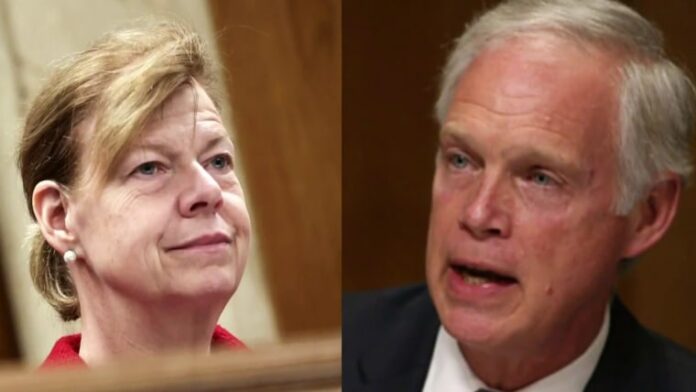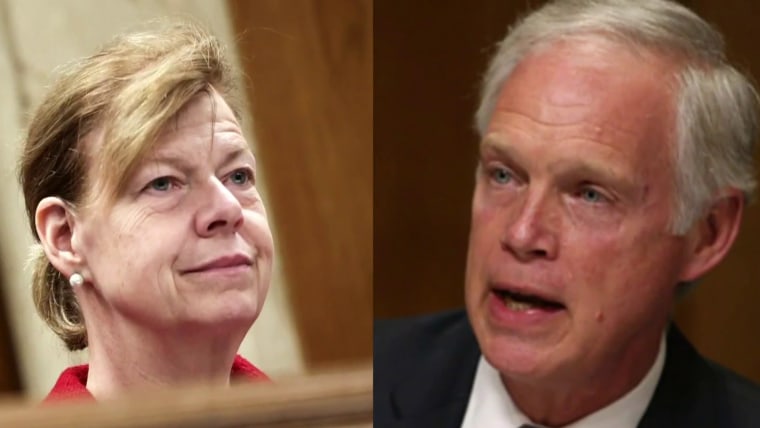Sen. Ron Johnson’s flip-flop on gay marriage was as inelegant as it was revealing.
In July, shortly after the Supreme Court overturned 50 years of settled law on abortion, Johnson, R-Wis., said he saw “no reason to oppose” federal legislation that would codify the right to same-sex marriage.
But just two months later he reversed course, saying that in fact he had no intention of supporting the Respect for Marriage Act “in its current state.” In explaining his volte-face, Johnson complained that he had been “hounded” by reporters and claimed he issued his news release endorsing same-sex marriage only to appease the media.
“You have to understand the process here. You’re walking down the subway in the Capitol and all of a sudden you get descended [upon] by national press,” Johnson told a conservative group this month. “You just get hounded on this crap, right? So, just to get ’em off my backs, I wrote a press release.”
There was, of course, a reason for the media interest.
The Dobbs decision has therefore suggested that essentially no settled law should be considered safe.
In his concurrence with the decision to overturn Roe v. Wade, Justice Clarence Thomas had written that the court should also revisit its decisions that legalized contraception (Griswold v. Connecticut), struck down sodomy laws (Lawrence v. Texas) and affirmed the right to same-sex marriage (Obergefell v. Hodges).
The Dobbs decision has therefore suggested that essentially no settled law should be considered safe. As a result, it’s little wonder that lawmakers moved quickly to write federal guarantees for same-sex marriage into law. Support for codifying Obergefell seemed bipartisan, with a number of Republicans — including Johnson — signaling their backing.
But in late July, social conservatives began to push Johnson hard. One of Wisconsin’s most prominent anti-gay organizations, Wisconsin Family Action, launched a campaign to persuade him to oppose the legislation, calling it “a dangerous bill.”
“It’s a direct threat to religious freedom,” Julaine Appling, the group’s president, told the Milwaukee Journal Sentinel.
Within weeks, Johnson caved.
In audio captured by the Heartland Signal, Johnson explained to a conservative group on Sept. 1 that he agreed with Thomas’ legal reasoning but insisted that even though it overturned Roe, the court would never overturn Obergefell. “Justice Thomas is probably right that [Obergefell] was wrongly decided,” he said. “But that’s a different issue as to whether or not the Supreme Court will overturn it.”
“They never will,” he said.
Johnson did seem conflicted, saying he didn’t “want to see millions of lives disrupted.” But, he insisted, merely mentioning the issue was overly divisive. “Move on, OK? We’ve got enough problems.”
And he lashed out at the bill’s proponents. “I’m not happy with the Baldwins of the world who are just opening that wound,” he said, referring to his Wisconsin colleague Tammy Baldwin, the first lesbian to be elected to the Senate.
So to summarize: Johnson was for codifying same-sex marriage before he was against it, he agrees with Justice Thomas’ argument that Obergefell had been wrong decided — and therefore unconstitutional — but he insists that there was no chance that it would ever be overturned, and he blames the media for forcing him to falsely proclaim his support.
Even the most cynical of pols cringed at this convoluted chop logic.
The New York Times columnist Bret Stephens offered a fitting political epitaph for Johnson: “His principles are lousy, and he’s not a man of principle.”
But Johnson is a man in a desperate fight for another term, and it’s not clear that he’s a man of political savvy, either.
The latest Marquette University Law School poll found that only 39% of registered Wisconsin voters had favorable views of Johnson. His negative rating clocked in at 47%. So far this year, his negative numbers haven’t moved, even though the new poll shows him with a statistically insignificant lead over Democratic challenger Mandela Barnes.
In a normal political world, Johnson would be pivoting toward the center in a state as evenly divided as Wisconsin. But he made a different calculation: In Wisconsin, the partisan divisions are stark, and elections have become contests decided by which party can most successfully turn out its base. There are few undecided voters, this arguments goes, and precious few swing voters. So Johnson has to hold on to every single Republican vote.
But there is a fundamental flaw in this logic.
Support for legalized same-sex marriage among Wisconsin Republicans was 27 points higher than opposition.
A poll this year found that 72% of Wisconsin’s registered voters favor legalized same sex marriage, and support has been rising in every partisan group, including Republicans.
In 2014, only 30% of Republican voters favored gay marriage. But since then the ground has shifted dramatically. In April, the same poll found that same-sex marriage was favored by 84% of Democrats, 82% of independents and 58% of Republicans.
In fact, support for legalized same-sex marriage among Wisconsin Republicans was 27 points higher than opposition.
What’s happening in Wisconsin is also consistent with national trends. As my Bulwark colleague Will Saletan notes, Republican voter opposition to same-sex marriage has plummeted: “In 2004, 84 percent of Republicans said they were against allowing such marriages. By 2015, that number had plunged to 49 percent. In the latest NBC News poll, taken in May, it’s down to 31 percent.” The same trend is reflected in the Pew Research tracking polls, which found in 2019 that 56% of “Republican leaners” favored same-sex marriage.
The shift is even more pronounced among younger Republicans. According to the May NBC News/Wall Street Journal poll, the percentage of Republican adults under 50 who favor “allowing gay and lesbian couples to enter into same-sex marriages” has more than doubled, from 25% to 55%, since 2009.
But Johnson is clearly terrified of offending even a sliver of the right — even if that means being held hostage by a shrinking minority of his own base.
In the GOP circa 2022, he’s not alone.









